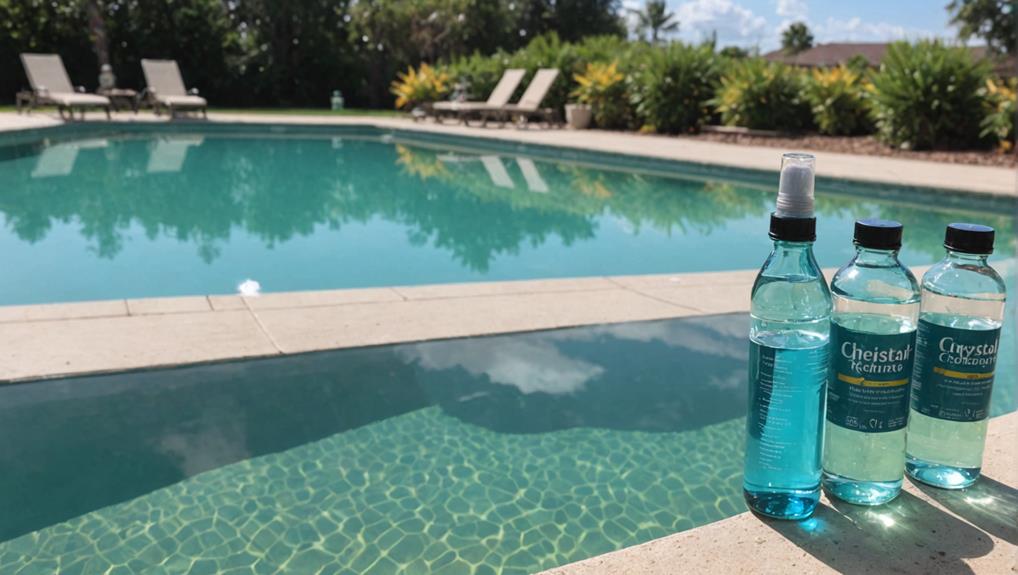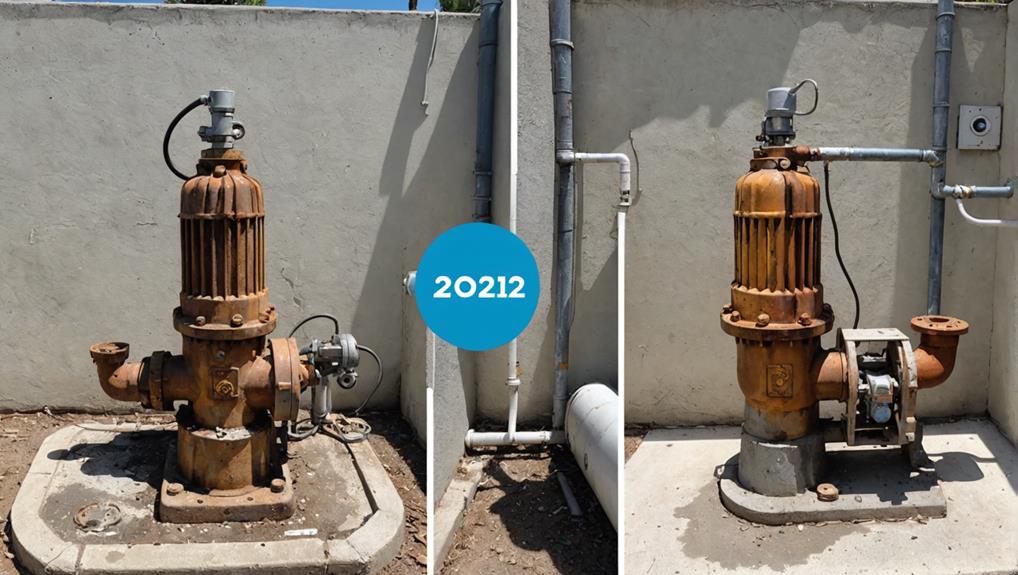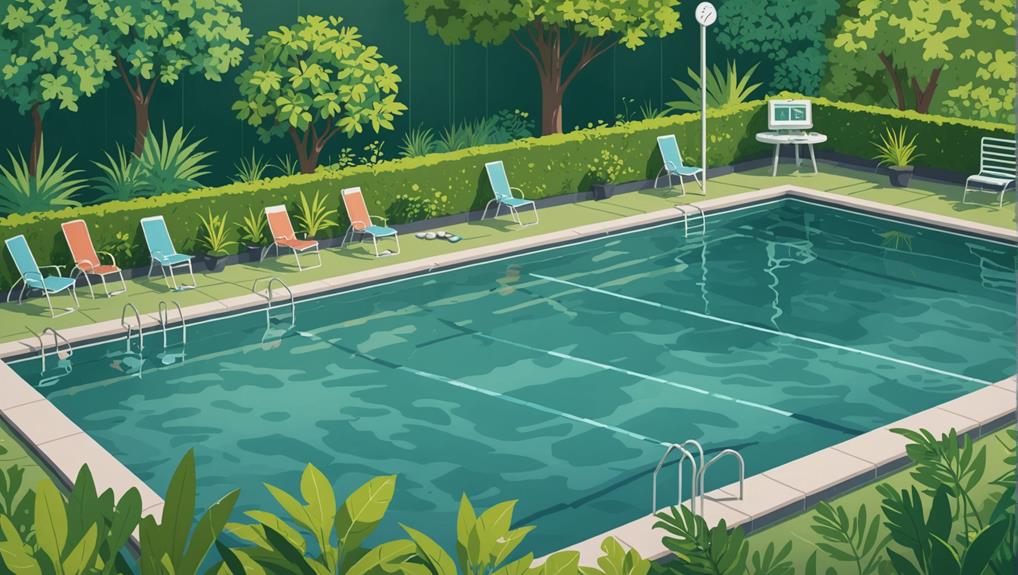When you don’t maintain a delicate balance of chemical parameters in your pool water, you risk exposing swimmers to skin and eye irritations, respiratory problems, and even corneal ulcers. Corroded equipment and permanent damage to the pool can also occur. By achieving a balanced chemical state, you’ll prevent damage, provide a safe and enjoyable swimming experience, and maintain a healthy environment for swimmers. Learn how to test and balance your pool water chemistry to avoid these consequences and guarantee a safe and enjoyable swimming experience for all.
Key Takeaways
- A chemical imbalance can cause permanent damage to pool equipment and lead to costly repairs or replacement.
- Incorrect chemical levels can lead to skin and eye irritations, as well as allergic reactions and respiratory problems.
- Balanced pool water chemistry prevents bacterial growth, eye and skin infections, and unpleasant odors, ensuring a safe swimming environment.
- Regular testing and balancing of pool chemicals is necessary to maintain a healthy and aesthetically pleasing swimming environment.
- A delicate interplay of chemical parameters is required to prevent cloudiness, eye irritation, and corrosion, making chemical balance crucial for pool maintenance.
Chemical Imbalance Consequences
If your pool’s chemical balance is off, you can expect a range of unpleasant consequences, from eye and skin irritation to corroded equipment and even permanent damage to the pool itself.
When the pool water balance is disrupted, it creates an environment conducive to corrosion, which can lead to costly repairs or replacement of pool equipment.
Additionally, skin irritations and eye irritations can occur when the chemical levels aren’t within the recommended range.
For instance, low calcium hardness levels can cause scaling, while incorrect pH levels can affect the efficacy of chlorine.
If the alkalinity levels are too high or too low, it can lead to an unstable pH, which can further exacerbate the problem.
As a pool owner, maintaining proper chemical levels regularly is crucial to prevent these consequences.
Importance of Balancing Chemicals
Importance of Balancing Chemicals
Maintaining a delicate balance of chemicals in your pool water is essential because it directly affects the health, safety, and longevity of your pool and its equipment. You, as a pool owner, prefer a safe and enjoyable swimming experience, which is only possible with proper chemical balance. Water must be balanced to prevent damage to your pool and equipment, as well as to guarantee the health and comfort of swimmers.
| Consequence of Imbalance | Effect on Pool and Swimmers |
|---|---|
| High pH levels | Eye irritation, skin problems, and etching of the pool surface |
| Low pH levels | Corrosion of equipment, skin and eye irritation, and respiratory issues |
| High alkalinity | Difficulty in adjusting pH levels, leading to further imbalance |
| Low alkalinity | pH levels fluctuate, causing your pH levels to swing |
| Inadequate sanitizer | Bacterial growth, eye and skin infections, and unpleasant odors |
Balancing pool chemicals is vital for pool maintenance. Pool water chemistry is important, and you must test and adjust the chemical levels regularly to maintain a proper chemical balance. By doing so, you’ll safeguard the longevity of your pool and equipment, as well as the health and safety of swimmers.
Pool Water Chemical Testing

As you take on pool maintenance, you’ll need to analyze your pool’s chemical composition regularly.
You have three main options for testing: using test strips for a quick snapshot, testing kits for a more detailed analysis, or digital testers for convenience and precision.
Pool Chemical Analysis
You must regularly test your pool water to determine the levels of various chemicals, such as chlorine, pH, alkalinity, and calcium hardness, to maintain a safe and healthy swimming environment.
This analysis is vital to guarantee the water is balanced and free from corrosion, which can damage your pool and its surroundings. Imbalanced water can also cause irritation to swimmers’ skin and eyes.
When analyzing your pool water, you should pay attention to the following key aspects:
pH levels: If the pH is too low, it can cause corrosion of the pool and its equipment, while high pH levels can reduce the effectiveness of chlorine and oxidizers.
Calcium hardness: Low calcium levels can lead to erosion of the pool’s plaster, while high levels can cause scaling and cloudy water.
Chlorine and oxidizer levels: These chemicals help sanitize the water and eliminate contaminants, but excessive levels can irritate swimmers’ skin and eyes.
Water Testing Methods
To guarantee accurate chemical balance, you’ll need to employ reliable water testing methods, which provide a precise snapshot of your pool’s chemical composition.
There are several testing methods to choose from, each with its own advantages. Pool test strips offer a quick and convenient way to measure pH, alkaline, and chlorine levels. They’re ideal for frequent, on-the-spot testing.
If you need a more detailed analysis, pool testing kits are the way to go. These kits require collecting small water samples and mixing with reagents, providing a thorough picture of your pool’s water chemistry.
Digital pool testers take it to the next level, connecting to your smartphone or device to offer convenience, detail, and easy tracking of test results.
Regardless of the method you choose, regular testing is vital to maintaining a clean, balanced, and safe pool. By testing your pool water regularly, you’ll be able to adjust pH levels, alkaline levels, and chlorine levels to achieve crystal-clear water that’s perfect for swimming.
Regular Testing Schedule
Establishing a regular testing schedule guarantees your pool water’s chemical composition remains stable and healthy, allowing you to catch potential issues before they escalate into major problems.
By testing your pool water regularly, you’ll be able to identify imbalances in your pool water chemistry and make adjustments to maintain optimal levels. This is crucial for balancing your pool, as even slight variations can affect the performance of your pool filters and overall pool service.
Test Your Pool Water weekly or biweekly, depending on usage, to ensure pH levels, alkalinity, and calcium hardness are within the recommended ranges.
Use pool test strips to quickly and accurately measure chlorine, pH, and alkalinity levels, and pool shock chemicals as needed to oxidize contaminants.
Regular testing also helps you determine when to adjust pH levels, add pool cleaning products, or perform other maintenance tasks to keep your pool water chemistry in balance.
Balancing Pool Water Chemistry
Properly balancing pool water chemistry requires a delicate interplay of various chemical parameters to maintain a safe, healthy, and aesthetically pleasing swimming environment.
You need to keep the water in a state of equilibrium, where all the chemical components work in harmony.
Balancing pool chemicals is vital, as it directly affects the pool water chemistry.
When you test the water, you’ll need to adjust the levels of pH, alkalinity, calcium hardness, and chlorine to achieve a balanced pool water.
If you don’t, you’ll risk cloudiness, eye irritation, and even corrosion.
To avoid these issues, you must regularly test the pool water and make adjustments as needed.
Remember, pool chemistry is all about finding the perfect balance.
Corrosion and Equipment Damage

When you fail to maintain a balanced pool water chemistry, corrosion and equipment damage become a real concern, as fluctuating pH levels and corrosive substances can wreak havoc on your pool’s machinery and infrastructure.
Unbalanced pool water can cause corrosion, which can lead to costly repairs and even replacements.
Corrosion can occur when the water chemistry is too alkaline or acidic, leading to a risk of corrosion that can damage pool parts.
High acidity in the pool water can corrode metal components, while hardness corroding pipes and fittings can lead to leaks and other issues.
If left unchecked, corrosion can spread quickly, causing widespread damage to your pool’s equipment and infrastructure, resulting in costly repairs and downtime.
It’s essential to monitor your pool’s water chemistry regularly to prevent corrosion and equipment damage.
By maintaining a balanced pool water chemistry, you can reduce the risk of corrosion and guarantee your pool operates efficiently and safely.
Skin and Eye Irritation Risks
Unbalanced pool water chemistry poses a significant threat to your health, as it can cause skin and eye irritation, ranging from mild discomfort to severe reactions. When the pH level of the pool water is too high or too low, it can lead to skin irritations, such as redness, itching, and rashes. Similarly, eye irritations can occur, causing redness, itchiness, and even blurred vision.
| Effects of Unbalanced Pool Water | Consequences |
|---|---|
| High pH Level | Skin and eye irritations, corneal ulcers |
| Low pH Level | Skin and eye irritations, respiratory problems |
| Incorrect Chemical Balance | Eye and skin irritations, allergic reactions |
As a pool owner, it’s vital to maintain the ideal chemical balance in your pool water to prevent skin and eye irritations. You should regularly test the pH level and adjust it accordingly to confirm it’s within the recommended range. Additionally, you should maintain the correct levels of other chemicals, such as chlorine and bromine, to prevent eye and skin irritations. By doing so, you can guarantee a safe and enjoyable swimming experience for yourself and others.
Safe Swimming Environment Guarantee

By maintaining a balanced chemical environment in your pool water, you can guarantee a safe and healthy swimming experience for yourself and others.
This is because a properly balanced pool water chemistry prevents skin irritations, eye problems, and infections caused by unbalanced chemicals. Additionally, it prevents corrosion of pool equipment and accessories, reducing the risk of costly repairs and replacements.
Balanced pool water chemistry prevents health issues: it prevents the growth of algae, bacteria, and other microorganisms that can cause health issues and make the water unappealing to swimmers.
It guarantees safe swimming: by maintaining a balanced pool water chemistry, you can confirm that the water is safe for swimmers, whether they’re children, adults, or seniors, and regardless of any pre-existing health conditions.
It boosts confidence: a safe swimming environment guaranteed by balanced pool water chemistry also boosts the confidence of swimmers, allowing them to fully enjoy their pool experience without worrying about their health and safety.
Frequently Asked Questions
How Often Do You Need to Balance Pool Chemicals?
You need to balance pool chemicals daily, considering seasonal fluctuations, water turnover, filter efficiency, and weather impact, with test frequencies adjusted for bather load, and supplemented by automation options, maintenance schedules, and shock treatments as needed.
What Happens if You Swim in a Chemically Unbalanced Pool?
When you swim in a chemically unbalanced pool, you’ll likely experience eye irritation, skin rashes, and respiratory issues, while also risking hair damage, infection, and discomfort.
What Is the Ideal Chemical Balance for a Swimming Pool?
“Think of your pool’s chemical balance as a symphony: you’re the conductor, orchestrating harmony among alkalinity levels (80-120 ppm), calcium hardness (200-400 ppm), chlorine levels (1-3 ppm), cyanuric acid (30-50 ppm), and pH ranges (7.2-7.8) for crystal-clear water clarity.”
How Important Is Ph Balance in a Pool?
You must maintain ideal pH levels, as fluctuations can cause acidic conditions, leading to eye irritation and skin infections, or alkaline states, resulting in scale formation, corrosive damage, and unwanted chemical reactions that compromise water quality.
Conclusion
As you gaze out at your pool’s sparkling surface, remember that beneath the calm exterior lies a delicate chemical balance.
Imagine a seesaw, where pH, alkalinity, and calcium levels teeter precariously.
If one side tips, the entire ecosystem is disrupted, threatening swimmers’ comfort and your pool’s integrity.
By maintaining this fragile harmony, you safeguard against corrosion, skin irritation, and equipment damage, ensuring a safe and rejuvenating oasis for all to enjoy.

I’m Max, the founder and chief pool enthusiast behind Pool Pro Tips. As a passionate pool owner and cleaning expert, I created this website to share my knowledge and experience with you, helping you to keep your pool sparkling clean and safe for years to come.

